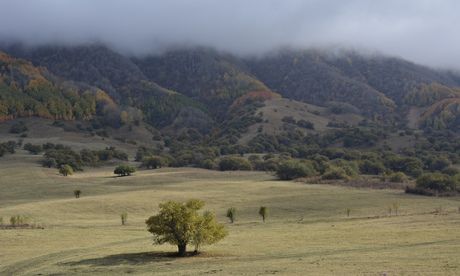Apples tumble all over the earth, and I slide with them into a huge old tree, a gentle shower of new fruit fall. I lie back into this soft, dark earth and smell the heady scent of ripening fruit. This Eden is on the side of a mountain in Kazakhstan, where apples originally came from.
I’ve dragged the chef Ben Reade along with me. Ben is an intrepid flavour explorer, and he likes an adventure. He will do ludicrous things to taste something new, or in this case something very old. He also has two things I need for this trip: a very good palate, which is important for describing apple flavours, and he’s very tall – at almost 6ft 6in he can reach more apples than me. So here we are, two redheads – one tall, one small – off to find the original apple.
The wild apple grows along the slopes of the Tien Shan mountain range, which borders China and Kazakhstan. The trees are found just above the poplars and below the spruces. Once upon a time these forests ranged so far they stretched right down into the city of Almaty, once the capital of Kazakhstan and which, as any resident will proudly tell you, derives its name from the Kazakh Alma-Ata – the fatherland of the apple.
This is a country in love with its fruit. Apples are sold everywhere from roadsides to shops to train stations. I didn’t see a garden with fewer than three apple trees.
Most apples are domesticated, cultivars of Malus domestica; but look carefully and every now and then you’ll see something smaller, wilder: the native M. sieversii, the original wild apple. It is these we’ve come to find.
M. sierversii is the most likely ancestor of our domestic apple. DNA analysis shows that it closely resembles the apple in your fruit bowl or at the bottom of your garden. These apples vary in size, shape, colour and flavour – the whole spectrum of the domestic apple is here in these small, wily fruits. Some taste of russets, some of apricots, or raspberries, or sweet wines, or heady ciders; the odd one is bitter and tannic.
Continue the reading in : Malus Kazakhstani
INC News, 10/11/2014


No comments:
Post a Comment